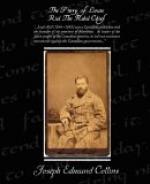obtain here. For years the half-breeds had been
making futile efforts to obtain their rights.
All these efforts had been met by rebuffs, or had
received no attention whatever from the Federal Government,
and those very rights for which the half-breeds were
supplicating and petitioning were being handed over
to railway corporations, colonization companies, and
like concerns. He would not say that the action
of the Government justified armed rebellion—the
shedding of blood—but it left in these
poor people those smouldering fires of discontent
that were so easily fanned into rebellion by a madman
such as Riel. The prisoner had been invited by
the half-breeds to come among them from a foreign country
to assist them in making a proper representation of
their grievances to the Government. They were
unlettered and required an active sympathizer, with
education sufficient to properly conduct the agitation.
Riel was the man they chose, and there was no evidence
to show that when Riel came to this country he came
with any intention of inciting the people to armed
rebellion. His work was begun and carried on
up till January in a perfectly constitutional manner.
After that time, as the jury had seen in the cross-examination
of the witnesses for the prosecution, no effort was
made by the defence to deny that overt acts of treason
had been committed in the presence of the prisoner;
but evidence would be brought to show that at the
time these acts were countenanced by the prisoner,
he was of unsound mind and not responsible for what
he did. The peculiar disease of the prisoner
was called by men learned in diseases of the mind,
“megalomania.” This species of mental
disease developed two delusions—one the
desire for and belief that the patient could obtain
great power in political matters to rule or govern,
another his desire to found a great church. That
the prisoner was possessed of these delusions, the
evidence abundantly proved. The jury might consider,
with some grounds for the belief, that the evidence
of Charles Nolin, who swore that the prisoner was
willing to leave the country if he obtained from the
Government a gratuity of $35,000, was inconsistent
with the real existence of such a monomania as the
prisoner was afflicted with. But not one isolated
portion, but the whole, of Nolin’s evidence
should be considered. Other portions of his testimony,
for instance, prisoner’s opinions on religious
matters, and his intention to divide up the country
between various foreign nationalities, were conclusive
proof of the prisoner’s insanity. This was
a great State trial, the speaker said, and he warned
the jury to throw aside the influence of heated public
opinion, as it was expressed at present. There
were many people executed for having taken part in
the rebellion of 1837, and it was questionable if
there could be found anyone now who would justify
those executions. The beat of private feeling
had died away, and the jury should be careful that




